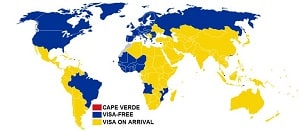How To Visit Cape Verde

How To Visit Cape Verde: Visiting Cape Verde involves several steps, including travel planning, obtaining the necessary documents, and understanding transportation options. Here's a general guide on how to visit Cape Verde:
1. Passport and Visa
Passport and Visa: Ensure your passport is valid for at least six months beyond your intended departure date.
Check visa requirements: As of my last knowledge update in January 2022, citizens of many countries, including the EU, US, and Canada, do not need a visa for short stays (usually up to 30 days). However, entry requirements can change, so verify this information with the Cape Verdean embassy or consulate.
2. Flight Booking To Cape Verde
Cape Verde Flight Booking: Book a flight to Cape Verde. The international airport, Amílcar Cabral International Airport (SID), is located on Sal Island, and there are other airports on various islands.
3. Accommodation In Cape Verde
Cape Verde Accommodation: Research and book accommodations. Cape Verde offers a range of options, from luxury resorts to budget-friendly guesthouses. Consider your preferences and budget when choosing accommodation.
4. Health Precautions In Cape Verde
Cape Verde Health Precautions: Check if any vaccinations or health precautions are required before traveling to Cape Verde. Consult your doctor or a travel health clinic for up-to-date advice.
5. Cape Verde Travel Insurance
Checkin Travel Insurance: Consider purchasing travel insurance that covers medical emergencies, trip cancellations, and other unexpected events.
6. Local Transportation In Cape Verde
Local Transportation: Plan how you will travel between the islands. Domestic flights and ferry services are available. Internal flights usually depart from Amílcar Cabral International Airport.
7. Cape Verde Local Currency
Checking Cape Verde Local Currency: The Cape Verdean Escudo (CVE) is the official currency. Exchange currency upon arrival or withdraw local currency from ATMs.
8. Local Transportation Within Islands In Cape Verde
Local Transportation Within Islands: Depending on the island, transportation options may include taxis, rental cars, and minivans. Some islands have a well-developed public transportation system.
9. Activities and Tours In Cape Verde
Cape Verd Activities and Tours: Plan your activities and tours. Whether you're interested in exploring historical sites, enjoying outdoor activities, or experiencing the local culture, Cape Verde has diverse options.
10. Respect Local Customs
Respect Cape Verde Local Customs: Familiarize yourself with local customs and etiquette to ensure a respectful and enjoyable visit.
Before Visiting Cape Verde
Before your trip to Cape Verde, check for the most recent travel information, entry requirements, and any changes in visa policies. It's also advisable to consult travel forums, guidebooks, or travel agencies for the latest updates on visiting Cape Verde.
4. Cape Verde Culture and Traditions
Cape Verde Family and Community: Family bonds are strong, and communities often function as extended families. Respect for elders and communal support are integral values.
Cape Verde Music and Dance: Cape Verdeans are known for their vibrant music scene, with genres like morna, coladeira, funaná, and batuque serving as cultural expressions. Cesária Évora, the “Barefoot Diva,” brought Cape Verdean music to international fame.
Cape Verde Cuisine: Cape Verdean food reflects its cultural fusion, with popular dishes like catchupa (a slow-cooked stew) and caldo de peixe (fish soup).
5. Cape Verde Religion
Cape Verde Christianity: The predominant faith, with Roman Catholicism being the most widespread denomination.
Cape Verde Religious Tolerance: Other Christian sects, as well as small Muslim and non-religious communities, coexist peacefully.
6. Cape Verde Lifestyle
Island Life: Daily life is influenced by the islands’ geography and resources. Fishing, farming, and tourism are vital livelihoods.
Pace of Life: Cape Verdeans value a relaxed and social lifestyle, with gatherings, music, and festivals playing a central role.
7. Cape Verde Education and Literacy
Education System: Education is free and compulsory up to the age of 16. The country has a high literacy rate, reflecting significant investments in education since independence.
Languages in Education: Portuguese is the primary medium of instruction, while efforts are being made to integrate Kriolu.
8. Hospitality and Social Etiquette
Warm and Welcoming: Visitors often note Cape Verdeans’ friendliness and openness.
Cape Verde Greetings: Handshakes or kisses on the cheek are common forms of greeting, depending on the level of familiarity.
Cape Verde Sharing Culture: Sharing food, drinks, and stories is an essential part of social interactions.
9. Cape Verde Challenges and Resilience
Cape Verde Emigration: Limited resources and opportunities have led many Cape Verdeans to seek better prospects abroad.
Cape Verde Adaptability: Despite challenges, Cape Verdeans are known for their resilience and resourcefulness.
10. Cape Verde Festivals and Celebrations
Cape Verde Carnival: Celebrated with parades, music, and dance, particularly on São Vicente and Santiago.
Cape Verde Saint’s Day Festivals: Each island celebrates its patron saint with processions, feasting, and traditional music.
Cape Verde Travel Communication: Learn a few basic phrases in Portuguese or Creole. Having a local SIM card or an international roaming plan can help you stay connected.
Stay Informed: Keep informed about local news and weather updates, especially during the rainy season when travel can be disrupted.
People of Cape Verde Travel Conclusion
The people of Cape Verde are a vibrant blend of cultures, traditions, and histories. Their strong sense of identity, coupled with their openness to the world, creates a unique and welcoming atmosphere for visitors. Whether through their music, food, or friendly interactions, Cape Verdeans leave a lasting impression on all who visit.
Safety Precautions in Cape Verde
Check Safety Precautions: Cape Verde is generally considered safe for travelers, but it's always wise to exercise standard safety precautions. Stay informed about local conditions and follow any travel advisories.





 |
|  |
|  |
|  |
| 